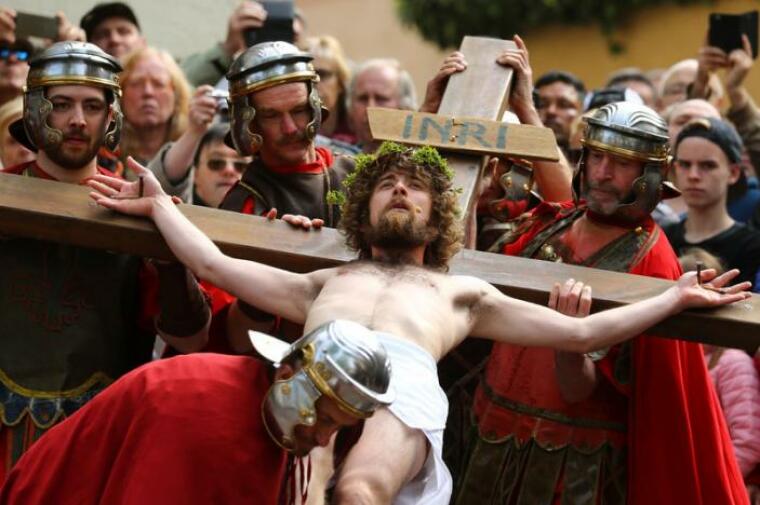Easter 2017: How the Christians across the globe celebrate Christ's resurrection

Easter Sunday is considered by Christians as the most important and sacred Sunday of the entire year because it marks the day when Jesus Christ rose from his grave.
Easter comes at the end of the Holy Week, right after Good Friday, which is considered as a day of mourning because it commemorates the Lord's crucifixion and death.
In the U.S., Easter is celebrated by 80 percent of Americans, and it ranks as one of the popular Church days of the year. Fifty-one percent attend church as part of the celebrations, while 57 percent celebrate the holiday by cooking a special Easter meal.
Easter egg hunts have become part of the tradition in many churches in America. Some say that eggs symbolize new life, just as Christ began a new life on Easter Sunday. The cracked eggs are said to represent an empty tomb.
This year, the Element Church in North Carolina made plans to celebrate the holiday by holding an Easter Egg Hunt with approximately 20,000 Easter eggs at the McNair Stadium.
The Holy Week and Easter are celebrated differently in other parts of the world.
In the Greek island of Corfu, residents hurl clay pots from their balconies to loudly celebrate death's defeat by Christ's resurrection. The tradition has been adopted by the Venetians who threw away their unwanted possessions on New Year's Day, according to The Independent.
In other parts of Greece, midnight mass on Easter is celebrated with a fireworks display, but on the island of Chios, two rival churches engage in a Rouketopolemos or a "rocket war." The parishes of St. Mark's and Panaghia Ereithiani fire homemade rockets at each other throughout the night, and the winner is declared after direct hits to the bell tower are counted the next morning.
In the Philippines, Christ's crucifixion is re-enacted on Good Friday by at least three Catholic devotees. The participants drag their crosses and flagellate themselves before they are actually nailed to wooden crosses. However, the practice has been discouraged by the Catholic Church, and the Department of Health has recommended for participants to get Tetanus shots and use sterilized nails.
In France, the villagers in Haux, Gironde celebrate Easter Monday with the feeding of all of its 1,000 residents with a giant omelet. The town square chefs prepare the 10-feet dish using 5,000 eggs, 110 pounds of bacon, onion, and garlic and cook it on a hand built fire. The feast has only become an annual tradition for 30 years, but it is traced back to a tale when Napoleon asked for a giant egg dish for his troops while they passed through the countryside.
Children in Sweden celebrate the Holy Week in a less conventional way. On Maundy Thursday, the children dress up as witches and knock on their neighbor's doors to ask for sweets. According to Swedish legend, witches went to have a party with the devil in the forest of Blakulla before Easter as he held his earthly court.
 Christians don't have to affirm transgenderism, but they can’t express that view at work: tribunal
Christians don't have to affirm transgenderism, but they can’t express that view at work: tribunal Archaeology discovery: Medieval Christian prayer beads found on Holy Island
Archaeology discovery: Medieval Christian prayer beads found on Holy Island Presbyterian Church in America votes to leave National Association of Evangelicals
Presbyterian Church in America votes to leave National Association of Evangelicals Over 50 killed in 'vile and satanic' attack at Nigerian church on Pentecost Sunday
Over 50 killed in 'vile and satanic' attack at Nigerian church on Pentecost Sunday Ukrainian Orthodox Church severs ties with Moscow over Patriarch Kirill's support for Putin's war
Ukrainian Orthodox Church severs ties with Moscow over Patriarch Kirill's support for Putin's war Islamic State kills 20 Nigerian Christians as revenge for US airstrike
Islamic State kills 20 Nigerian Christians as revenge for US airstrike Man who served 33 years in prison for murder leads inmates to Christ
Man who served 33 years in prison for murder leads inmates to Christ


 Nigerian student beaten to death, body burned over ‘blasphemous’ WhatsApp message
Nigerian student beaten to death, body burned over ‘blasphemous’ WhatsApp message 'A new low': World reacts after Hong Kong arrests 90-year-old Cardinal Joseph Zen
'A new low': World reacts after Hong Kong arrests 90-year-old Cardinal Joseph Zen Iran sentences Christian man to 10 years in prison for hosting house church worship gathering
Iran sentences Christian man to 10 years in prison for hosting house church worship gathering French Guyana: Pastor shot dead, church set on fire after meeting delegation of Evangelicals
French Guyana: Pastor shot dead, church set on fire after meeting delegation of Evangelicals ‘Talking Jesus’ report finds only 6% of UK adults identify as practicing Christians
‘Talking Jesus’ report finds only 6% of UK adults identify as practicing Christians Mission Eurasia ministry center blown up in Ukraine, hundreds of Bibles destroyed: 'God will provide'
Mission Eurasia ministry center blown up in Ukraine, hundreds of Bibles destroyed: 'God will provide' Church holds service for first time after ISIS desecrated it 8 years ago
Church holds service for first time after ISIS desecrated it 8 years ago Burger King apologizes for 'offensive campaign' using Jesus' words at the Last Supper
Burger King apologizes for 'offensive campaign' using Jesus' words at the Last Supper Uganda: Muslims abduct teacher, burn him inside mosque for praying in Christ’s name
Uganda: Muslims abduct teacher, burn him inside mosque for praying in Christ’s name